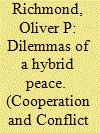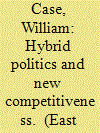| Srl | Item |
| 1 |
ID:
137636


|
|
|
|
|
| Summary/Abstract |
Hybrid forms of peace represent a juxtaposition between international norms and interests and local forms of agency and identity. A first stage may be tense forms of hybrid politics that maintain structural violence, fail to resolve the contradictions between local and international norms, and reflect the outsourcing of colonial style rule. This could be characterised as, or lead to, a negative form of hybrid peace. A positive form of hybrid peace would have the advantage of having resolved such contradictions through active rather than passive everyday agency. This article examines this range of dilemmas surrounding debates about hybrid peace.
|
|
|
|
|
|
|
|
|
|
|
|
|
|
|
|
| 2 |
ID:
085854


|
|
|
|
|
| Publication |
2008.
|
| Summary/Abstract |
In recounting Hong Kong's chief executive election in 2007, this paper charts the unexpected appearance of an "unauthorized" candidate and the occurrence of vibrant campaigning.
|
|
|
|
|
|
|
|
|
|
|
|
|
|
|
|
| 3 |
ID:
085752


|
|
|
|
|
| Publication |
2008.
|
| Summary/Abstract |
In recounting Hong Kong's chief executive election in 2007, this paper charts the unexpected appearance of an "unauthorized" candidate and the occurrence of vibrant campaigning. Further, as electoral competitiveness increased, the liberal form of authoritarian rule that has characterized politics in the Hong Kong Special Administrative Region (HKSAR) began to change in ways that parallel the electoral authoritarianism practiced in Singapore. This paper argues that such change, if regularized and enhanced, may bring greater stability to the HKSAR's politics, yielding greater legitimacy, popular compliance, and hence, new efficiencies in control. Even so, analysis of the chief executive election shows that this competitiveness was strongly resisted by the central government in Beijing.
|
|
|
|
|
|
|
|
|
|
|
|
|
|
|
|